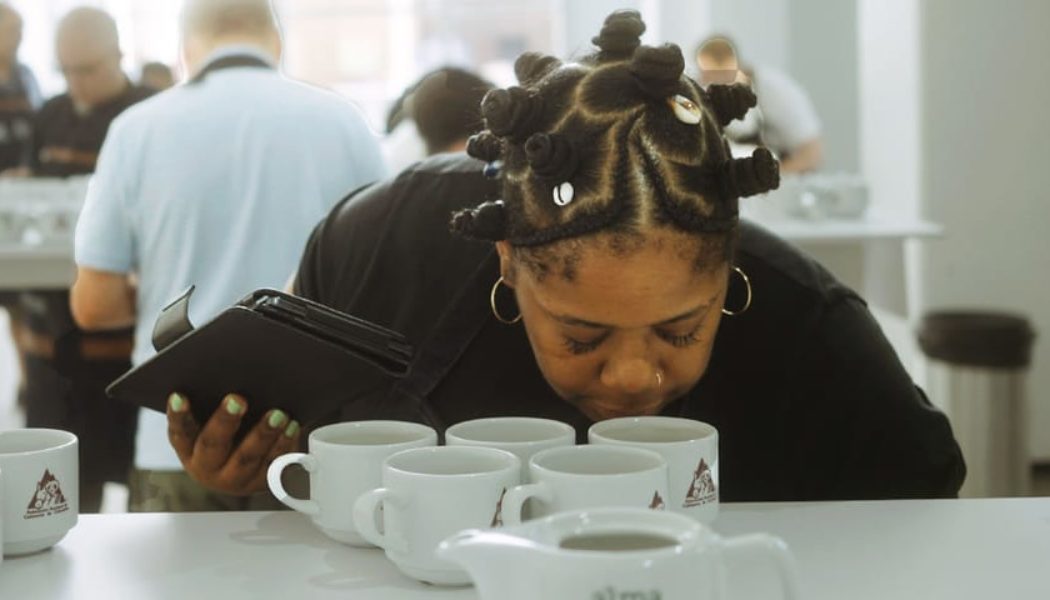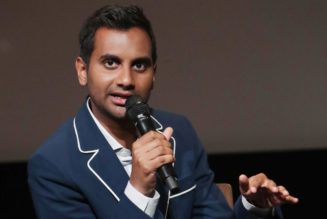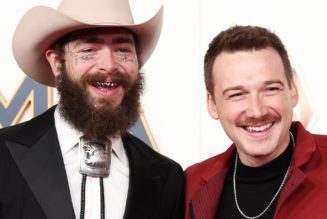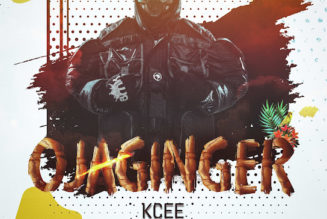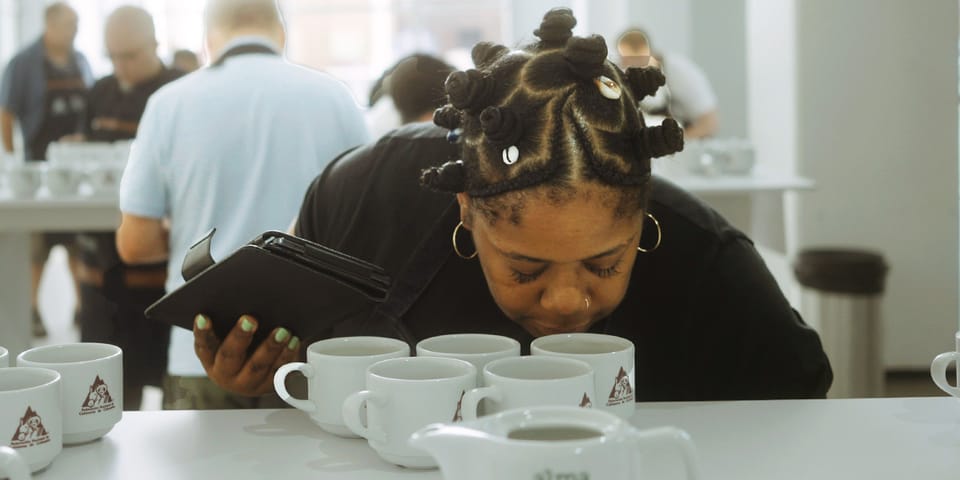
Nikisha Bailey always has something going on. If she’s not fulfilling her duties as the general manager of the web3-driven record label Nvak Collective, she’s either busy over at the Recording Academy as an executive board member and Vice President of its New York Chapter, furthering causes as a member of Women In Music’s advisory board, or visiting a coffee farm on behalf of her co-founded Win Win Coffee Bar. The common thread connecting all of her ventures? Community.
Her love of bringing people together and her entrepreneurial spirit were driving forces in the creation of Win Win Coffee Bar, which she co-founded with her friend, Matthew Namaste, three years ago. The brand is one of Philadelphia’s first Black women-led coffee roasters and distributors — Bailey explains that there is a lack of representation in the roasting, importing, distributing and ownership sides of the industry, and that less than 10% of the $500 billion USD industry goes back to the Black and Brown countries where these crops were birthed. To push back against this inequality, Bailey and Namaste created a supply chain that is 100% diaspora-focused and works with women-led farms in Africa. “That’s fueled me even more to make a difference in what ownership and equity look like in the music industry,” she says.
“With web3…artists can truly shape their destiny and be at the forefront of a new, inclusive and immersive musical experience.”
“Coffee, much like music, is a universal language,” Bailey states. She’s seen this play out firsthand during her career in the music industry, which started with studies in audio engineering at Webster University. She got her foot in the door as an intern at Atlantic Records and spent the next few years building her career in A&R, Admin and Operations at Atlantic, Def Jam Records and APG. She’s also taken on the role of artist manager for GRAMMY nominee Terrace Martin, but has since moved on from the traditional record labels to a more contemporary system with Nvak Collective, which focuses on artist advocacy and embraces web3 technology to place a greater emphasis on change for creators and intellectual property. “I think currently web3 is empowering creators to take control of their artistry and connect directly with engaged audiences,” she says “Any time a new technology is introduced into the industry, it allows for actual real ownership within the creative community.”. Decentralization and community-driven platforms give musicians the opportunity to build dedicated fan bases and establish direct connections with their audience.”
“It’s a refreshing shift,” she adds, “enabling artists to define their own narrative, engage fans on a deeper level and explore innovative ways of monetizing their work. With web3, the music industry is entering an era where artists can truly shape their destiny and be at the forefront of a new, inclusive and immersive musical experience.”
In three words, how would you describe your jobs to someone who isn’t familiar with the music industry?
Perpetual dot connector.
Can you run us through a day in your work life?
Because I’ve worked so hard to immerse myself in all facets of running a label, my days can be so different. They run anywhere from planning NFT drops to supporting and organizing studio sessions in Malawi, being a soundboard for my team and helping them critically think of difficult situations or hopping on the road with an artist who’s on tour. One thing I know for sure is that some form of negotiating will be in there. I take great pride in knowing that I have become a firm and sensical — yet — effective negotiator throughout my years in this industry.
A big part of your career has been focused on community, diversity and inclusivity. As someone who’s been around to see the progressive changes in the industry, what would you say has made the biggest overall impact?
Representation means everything. I’ve always been a firm believer that if you see it, you know that it’s possible to achieve it. Change in terms of diversity and inclusion has to be intentional — it has to be ingrained into the culture of a company and it also has to come from the top down.
Did you always know you wanted to have the career you do now, and did school play any part in inspiring you to this path?
I knew that I wanted to work in music and that I wanted to live in New York. Other than that, I kind of let the dots connect themselves but made sure to react to opportunities that presented themselves early in my career. I had an amazing professor in college named Gary Gottlieb who got me my first internship in NY at Sony Studios, and that really jump-started my story in the music industry.
“Change in terms of diversity and inclusion has to be intentional — it has to be ingrained into the culture of a company and it also has to come from the top down.”
What are the necessary first steps someone should take to enter a career in music as an executive?
Do your research. Make sure you know something about the company and the roles that you are applying for. Attend networking events, webinars, etc. Try and meet as many people as possible so that you have a wide net of potential resources and connections to make down the road.
Get comfortable talking about yourself! If you get a meeting or an interview with someone who you want to work for or have mentor you, make sure you do a majority of the talking. Show your personality and be confident in talking about what makes you the best candidate.
What lessons and/or work ethics did you only pick up after working in the music industry?
I live by my calendar. If it’s not in my calendar, it’s not real. Working in the music industry also further ingrained the fact that relationships are everything, and the community that you build throughout your career will be the one that always shows up for you.
What was the biggest challenge you’ve had to face so far and how did you overcome it?
Moving to a new city with only an internship lined up; having to find housing, find jobs to support myself and really get my footing on my own fresh out of college. I did everything on my own and it was hard, but I think it set the tone to show me that I could overcome any obstacle set before me through dedication, persistence and just always betting on myself. In the music industry, challenges can happen every day. It’s about how you approach them, how you work through them and what knowledge you retain after the fact.
Is there a secret to career longevity in this industry?
Being able to show up as who you really are in this industry will not only give you longevity in your career, but also in your life in general. You want to also make sure that your character and the quality of person that you are precedes any role that you have. That will do more for you than any artist connection, any co-sign, etc. When others speak highly of your presence in rooms when you’re not around is the real flex.
“You want to also make sure that your character and the quality of person that you are precedes any role that you have.”
What are some habits you follow regularly to always maintain a good headspace for work?
My morning routine kind of came into place because of COVID-19, and it has really helped me make sure I set aside daily time for myself. After I wake up, I take my dog to the park, go to the gym, make breakfast, catch up on news and start my work day from there. I dedicate two to three hours every morning to myself and my routine before checking any work email.
What’s the key in balancing all your roles?
Time management, for sure. Again, I live by my calendar! Also having great support systems in each of my roles allows me to be able to make sure I’m constantly staying on task with everything that I do. Lastly, also understanding that plans change. It’s okay to shift a deadline or change your schedule if it’s properly communicated to all parties involved. Life happens. Give yourself time and grace.
What does a day off look like for you?
A day off is typically spent catching up with friends and family, cooking (I love to grill) or planning my next visit to a coffee farm!
How do you see your jobs evolving with the music industry in the next five years?
I do think we’ll begin seeing more web3-based roles at music companies. The technology is still a very new territory but there is money to be made there. Wherever there is revenue, the industry will for sure follow.
If not working in music, what would you be doing?
I’m already doing it — working hard to create an equitable and just coffee supply chain that puts more of the revenue and rewards into Black and brown hands… but also maybe something in politics!
Stay tuned for more features with music industry professionals — from managers to sound engineers, stagehands and others; the people who make the music world go round without standing behind a microphone.
